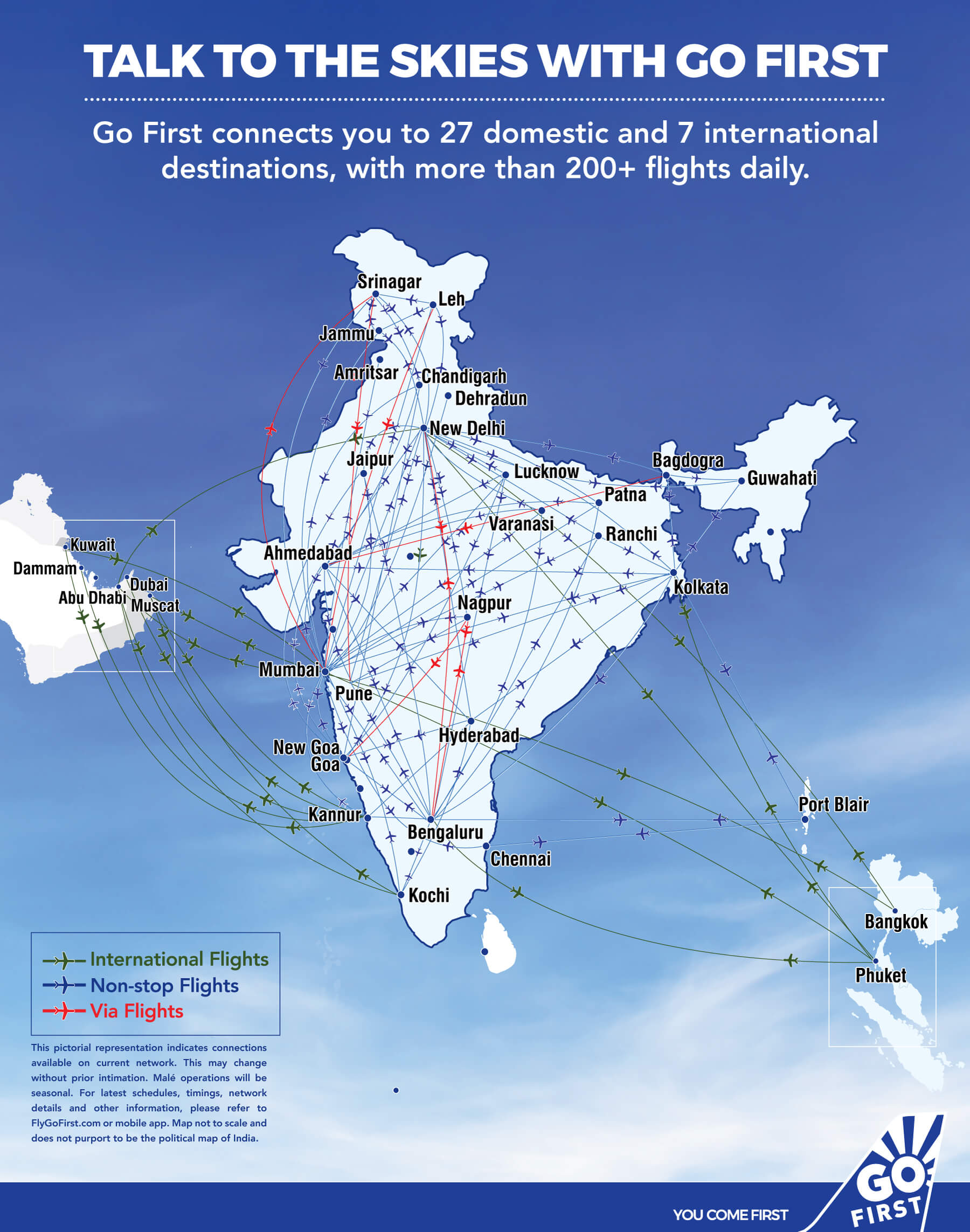Report by Yashasvi Anika Tandon
Go First Airline is facing a financial crunch. It has suspended all flights from 3rd May till 5th May 2023. It has also stopped all flight bookings till 15th May 2023. The airline says that it has incurred revenue loss of Rs. 10000 crores. It has sought compensation of Rs. 8000 crores from Pratt and Whitney.
To understand this issue, let us go further back.
What is Go First?
Go First is an airline which is owned totally by the Wadia group headed by Nusli Wadia. The group also owns Britannia Industries Limited, Bombay Burma Trading Corporation Limited, and Bombay Dyeing and Textile Manufacturing Company Limited.
Founded as Go Air in 2005, the airline is a low-cost aviation company. It operates in 29 destinations in India and 11 destinations internationally.
History
Go First started operations in 2005. A year later, Indigo started operations – in August 2006.
At this time, Indigo has a fleet of over 300 aircrafts while Go First has 57.
Both the companies used the engines of Pratt and Whitney Company, Inc, a US based organisation.
The Story of a Wrong Purchase
Airbus and Boeing are the two major companies that supply aircraft to commercial airlines all over the world.
A 320 is a bestselling aircraft model. In 2014, it switched to a new, more fuel-efficient engine. The new class of aircraft was called A 320 Neo.
GoFirst bought many of these aircraft for its fleet. It was this purchasing mistake that led to the eventual failure of the airline. Read on to find out how.
Why only GoFirst?
Issues related to PW Airbus A320Neo family of engines were faced by both Indigo and Go First but Indigo had a larger fleet of aircraft and relied on two aircraft suppliers. So, it did not suffer major financial losses due to grounding (non-operation of aircraft for safety reasons) of its aircrafts.
Go First has had many top-level changes since it started operations in 2005. So, it has not had stability in leadership. Besides, capital was not invested regularly and neither were sufficient aircrafts added to the fleet.
What was happening before the pandemic?
In 2011, Go First Airlines placed an order of 72 A320neo aircraft engines from P&W. They also made an agreement with P&W based on three conditions:
1. If an engine failed it was P&W’s responsibility to provide a spare one within 48 hours of grounding of the plane.
2. As engines were under warranty, any faulty aircrafts were to be repaired free of cost.
3. A compensation would have to be paid by P&W, when an aircraft was grounded, as it caused loss of business.
Go First selected P&W, as it promised better fleet management, more fuel-efficient engines, less service was required and the aircrafts were quieter. When Go First received the first batch of engines in 2016 they began facing problem within six months.
Till 2020, P&W adhered to the agreement.
In 2022, post the COVID pandemic, there were even more engine failures, as P&W was not providing maintenance.
Also, soon after the engine for the Airbus A320Neo was launched, airlines such as Indigo, Jet Blue, Hong Kong Express, Lufthansa, Nippon, and others faced issues.
Indigo replaced all A320Neo aircraft engines with better and modified engines.
What is happening now?
After Go First faced issues with P&W’s engines for Airbus A320Neo, it had to ground 25 aircraft which comprised nearly half its fleet.
The faulty engine rate went from 7% in December 2019 to 31% in December 2020 and then to 50% in December 2022.
P&W offered to supply engine replacement “at a rate four times lower than the rate of failure”. So, Go First approached Singapore International Arbitration Commission (SIAC) since P&W did not supply spare engines as mentioned in the maintenance agreement.
The arbitration award of 30th March 2023 stated that P&W must supply 10 engines to Go First by the 27th of April 2023. After that they had to supply ten spare engines every month till December 2023.
P&W did not implement this order. Go First approached SIAC once more and a second arbitration order was issued by SIAC to P&W which was again ignored by P&W.
Now, Go First filed a case in the Delaware court of USA, against P&W.
Simultaneously, Go First, filed for voluntary insolvency in the National Company Law Tribunal (NCLT), making it the second Indian Airlines to do so after Jet Airways.
What is voluntary insolvency?
In voluntary insolvency, a company declares it’s business as insolvent stating that they cannot pay their debts anymore and need some help to sort out their financial problems.
What are the reactions of Go First’s creditors?
Go First’s major financial creditors are Central Bank of India Limited, Bank of Baroda Limited, Axis Bank Limited, IDBI Bank Limited, and Deutsche Bank Limited.
The Central Bank of India is the largest creditor with exposure of Rs. 1987 crores. Bank of Baroda’s share is Rs. 1430 crore, Deutsche Bank’s is Rupees 1320 crores while IDBI bank has a share of Rs. 58 crores.
Central Bank of India, Bank of Baroda and Deutsche are willing to restructure the debt and provide a longer time period for repayment of the loans. They are unwilling to take any risk by extending further loans and increasing their exposure.
Indian Oil has invoked a bank guarantee of 500 crores.
In the meantime, GoFirst has reached out to NCLT (National Company Law Tribunal). It wants the regulatory agency to stop lessors from taking away aircraft and/or take any other action while the insolvency proceedings are going on.
Featured image is from the website of GoFirst Airline. It shows the most recent network map of the airline.

